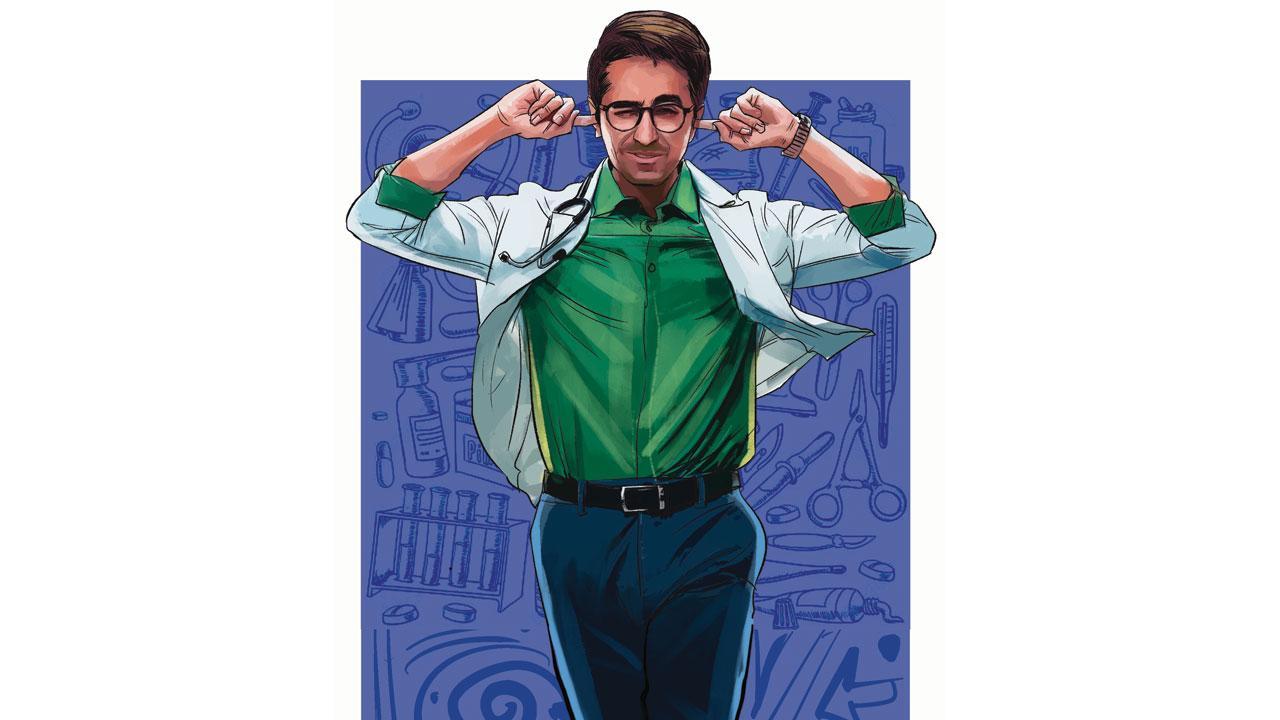The direction is occasionally heavy handed, but the overall impact is solid

Illustration/Uday Mohite
![]() A stree rog—gynaecology ward—in a public hospital in Bhopal is an unusual setting for a film to launch a frontal attack on Indian patriarchy, and reveal how deeply internalised is the male sense of entitlement, possessiveness and hypocrisy. But Anubhuti Kashyap, directing her debut feature, pulls it off with panache. Gangs of Wasseypur I and 2 was at the Cannes Film Festival and acclaimed worldwide. How many of us cared to know, or remember, that Anubhuti Kashyap was Associate Director on the film? It’s a good example of how easily women’s talent and work is overlooked in Bollywood and elsewhere, and how you can raise the quality of films simply by giving talented women a chance. Kashyap had earlier directed the web series Afsos (Amazon Prime), several shorts including one for Netflix’s Home Stories and Moi Marjani. Apart from Gangs of Wasseypur 1 and 2, she was also Assistant Director on Aamir and Dev D.
A stree rog—gynaecology ward—in a public hospital in Bhopal is an unusual setting for a film to launch a frontal attack on Indian patriarchy, and reveal how deeply internalised is the male sense of entitlement, possessiveness and hypocrisy. But Anubhuti Kashyap, directing her debut feature, pulls it off with panache. Gangs of Wasseypur I and 2 was at the Cannes Film Festival and acclaimed worldwide. How many of us cared to know, or remember, that Anubhuti Kashyap was Associate Director on the film? It’s a good example of how easily women’s talent and work is overlooked in Bollywood and elsewhere, and how you can raise the quality of films simply by giving talented women a chance. Kashyap had earlier directed the web series Afsos (Amazon Prime), several shorts including one for Netflix’s Home Stories and Moi Marjani. Apart from Gangs of Wasseypur 1 and 2, she was also Assistant Director on Aamir and Dev D.
Doctor G is about medical student Dr Uday Gupta (Ayushmann Khurrana), who is keen to study orthopaedics but is stuck with a seat in gynaecology. Worse, as the only male student in a class full of women students, and ragged by female seniors, he’s keen to get a transfer, his twerpy logic being “Jo cheez mere paas hai hi nahin, uska ilaaj main kya karoonga?” Through his interactions with his girlfriend (soon ex-), his current crush Dr Fatima Siddiqui (Rakul Preet Singh), woman professor Dr Nandini Srivastav (Shefali Shah), women students and female patients, he understands his own prejudices about women, how to “lose the male touch,” learn to “listen to women,” and also realises the monstrous impact of overall patriarchy in society.
Kashyap directs a layered, nuanced film, with distinct characters and narrative strands. Her feminism comes not through macho women being “one of the boys,” but through routine situations: both Uday’s ex-girlfriend and current crush Dr Fatima Siddiqui tell him that he simply doesn’t listen to women as in doesn’t hear what they’re saying. We see his misplaced outrage when his mother Shobha (Sheeba Chadha) looks for love—just as he does. The direction is occasionally heavy handed, but the overall impact is solid.
Ayushmann Khurrana is in good form, and even though he is in a familiar offbeat role, his courage in taking risks must be acknowledged. Rakul Preet Singh (filmography of over 35 films in multiple languages) is confident, if occasionally trying too hard. Shefali Shah is ever dependable, while Sheeba Chadha is good in an also familiar mom’s role, but allowed more play. It is a pleasure to see Indraneil Sengupta as Uday’s brother Ashok (80-strong filmography in Bengali and Hindi, including the Aranyak series, Buddhadeb Dasgupta’s Janala and Sujoy Ghosh’s Kahaani. Priyam Saha (Jenny) and Shraddha (Dr KLPD) shine in small roles.
The screenplay, by Sumit Saxena, Saurabh Bharat, Vishal Wagh and Anubhuti Kashyap, is strong and touches on many sensitive man-woman relationship issues. When the possessive husband of a woman patient sees Dr Uday do a medical examination of his wife, he thrashes him. Dr Fatima Siddiqui also teaches Uday that, amazingly, there is such a thing as friends without benefits. The second half changes tone, upping the stakes on male exploitation of women, as Uday is forced to organise a dramatic abortion for a pregnant, underaged schoolgirl. The abortion could have been fatal for the girl, who is abandoned by her partner, and in saving her life, Uday Gupta finds his purpose in life. But the film is also feminist in other ways: when Dr Uday lectures his mum on his sacrifices for her, he learns of her own sacrifices raising him as a single mum for which she never claimed credit. Big kudos to the screenplay also for the courage to normalise an empowered, beautiful, confident Muslim woman doctor—as we see in real life—while mostly, Right wing Bollywood’s new full-time profession is to demonise minorities.
Eeshit Narain’s cinematography is efficient, while Prerna Saigal’s editing packs the film tightly; less would have been more, but that’s carping. Kudos to producer Junglee Pictures, who earlier made the excellent Raazi, Badhaai Ho and Badhaai Do. The women’s crew includes director Anubhuti Kashyap, co-producer Amrita Pandey, editor Prerna Saigal and production designer Bindiya Chhabria. Recommended.
Meenakshi Shedde is India and South Asia Delegate to the Berlin International Film Festival, National Award-winning critic, curator to festivals worldwide and journalist.
Reach her at meenakshi.shedde@mid-day.com
 Subscribe today by clicking the link and stay updated with the latest news!" Click here!
Subscribe today by clicking the link and stay updated with the latest news!" Click here!










